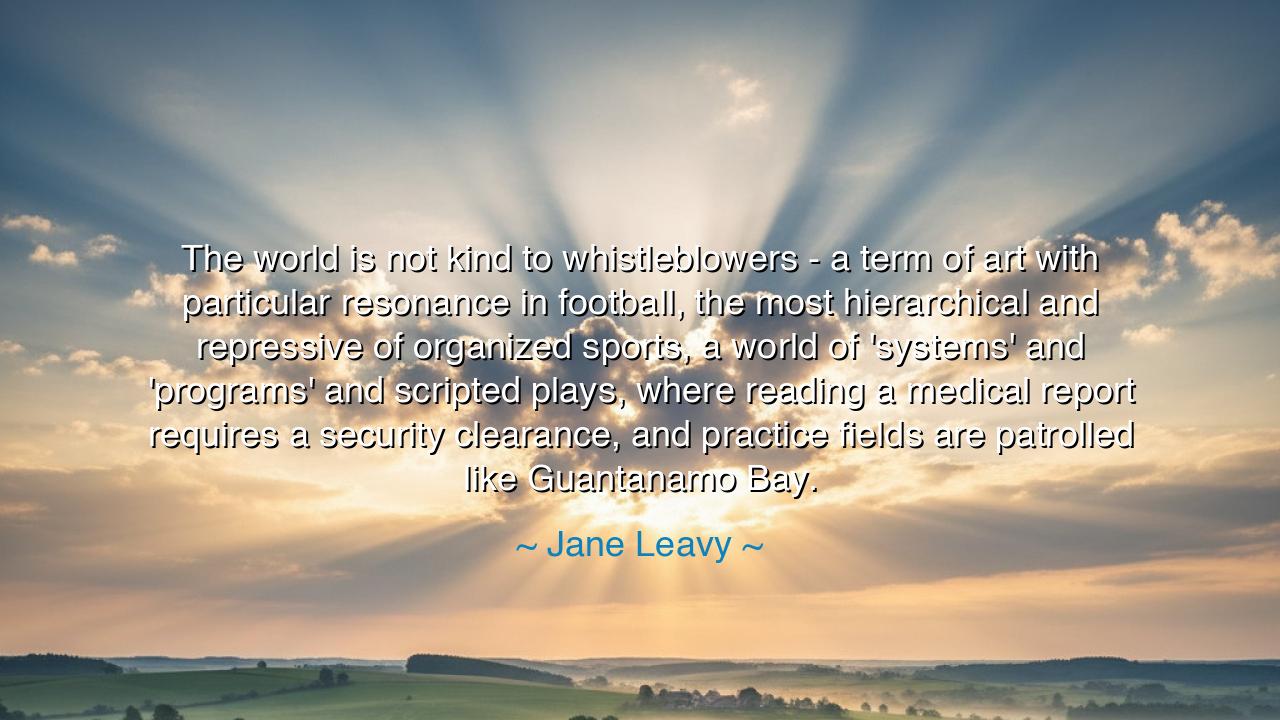
The world is not kind to whistleblowers - a term of art with
The world is not kind to whistleblowers - a term of art with particular resonance in football, the most hierarchical and repressive of organized sports, a world of 'systems' and 'programs' and scripted plays, where reading a medical report requires a security clearance, and practice fields are patrolled like Guantanamo Bay.






When Jane Leavy declared, “The world is not kind to whistleblowers — a term of art with particular resonance in football, the most hierarchical and repressive of organized sports, a world of ‘systems’ and ‘programs’ and scripted plays, where reading a medical report requires a security clearance, and practice fields are patrolled like Guantanamo Bay,” she unveiled not only the harshness of sport but also the timeless plight of truth-tellers in every age. Her words burn with imagery, for they paint a world where secrecy reigns, where authority is guarded like a fortress, and where those who dare to reveal truth are punished, not praised.
The meaning of her observation rests in the tension between power and honesty. A whistleblower is one who dares to sound the alarm when corruption, injustice, or harm is hidden behind walls of authority. In football, as in politics or empire, such acts are rarely welcomed. The guardians of the system prefer silence, for silence protects their control. To challenge the order is to invite exile, ridicule, or worse. Leavy likens practice fields to Guantanamo Bay, not in cruelty of chains, but in the ferocity with which access and information are guarded. In such a climate, truth becomes contraband, and the whistleblower, a criminal.
The ancients knew this story well. Consider Cassandra of Troy, gifted with prophecy, cursed never to be believed. She saw the doom that hid within the wooden horse, yet her warnings were dismissed, and her fate was to bear truth alone, despised and unheeded. The whistleblower is a Cassandra in modern garb, crying out against dangers within the fortress of sport, government, or company, yet finding themselves punished for their courage rather than honored for their foresight. The world, as Leavy proclaims, is not kind to them.
History too gives us Socrates, who raised his voice against the corruption of Athens, questioning the false wisdom of its leaders. For this, he was silenced with hemlock. Or recall the twentieth century’s Daniel Ellsberg, who released the Pentagon Papers, unveiling truths hidden by power. Though his revelations reshaped history, he was branded a traitor by those he exposed. In every age, the whistleblower suffers the same fate: they shine light into darkness, and those dwelling in shadows rush to extinguish it.
Leavy’s focus on football is symbolic as much as literal. The sport, with its rigid programs, hierarchical coaching trees, and obsession with secrecy, becomes a mirror of all institutions where conformity is demanded and dissent is crushed. The fact that even a medical report must be guarded as though it were a military secret reveals the depth of fear and control. In such worlds, the price of honesty is exile, and the reward for silence is belonging.
The lesson for us is fierce and clear: truth is never easily welcomed, yet it is always necessary. If you would live with integrity, be prepared for resistance. Understand that to blow the whistle, to speak what others wish hidden, is to step onto the path of Cassandra, of Socrates, of countless souls who bore the burden of honesty. You may lose status, comfort, or safety, but you will gain the one treasure greater than all — the knowledge that you did not betray your conscience.
Practical actions rise from this wisdom. Support those who speak truth, even when their voices are trembling and their cause is unpopular. Question the systems that demand blind obedience, whether in sport, workplace, or nation. Refuse to let loyalty to hierarchy outweigh loyalty to justice. And when you see wrongdoing cloaked in secrecy, remember that silence is complicity, but truth, though costly, is sacred.
Thus, let Leavy’s words stand as a warning and a call: the world is harsh to the whistleblower, yet the world depends upon them. Without their courage, corruption festers and power consumes itself unchecked. May you, when the time comes, choose the harder road — to speak, to reveal, to resist — for in the end, the voice that dares to cry out in a repressive world is the voice that keeps freedom alive.






AAdministratorAdministrator
Welcome, honored guests. Please leave a comment, we will respond soon